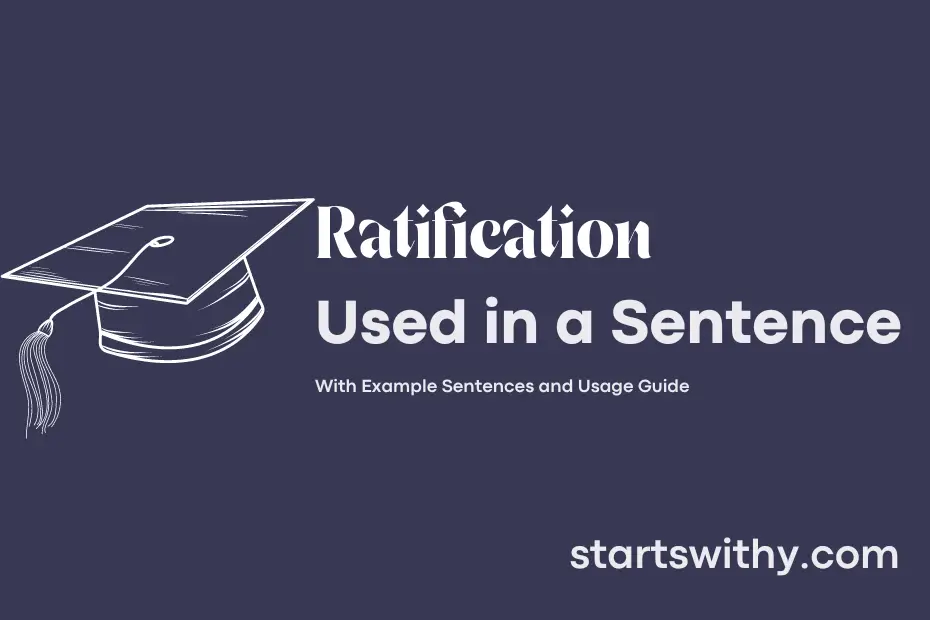Ratification is the formal approval or validation of something, often a decision or agreement. Whether it’s a treaty between nations, a policy within a company, or a constitutional amendment, ratification serves as the crucial final step in making it official. This process ensures that the necessary parties have given their consent and are bound by the terms laid out.
Understanding how ratification works is essential in numerous contexts, from international diplomacy to local governance. By examining the intricacies of this process, we gain insight into how decisions are solidified and upheld in various spheres of society. Let’s explore the significance and implications of ratification in different scenarios.
7 Examples Of Ratification Used In a Sentence For Kids
- The teacher said our project needed ratification.
- We must get ratification from our parents for the field trip.
- The principal’s signature is the ratification we need for our club.
- The judges will give ratification to the winner of the competition.
- We need the ratification of all our team members to start the game.
- The president’s approval is the ratification we need for the new rule.
- We must wait for ratification from the higher authorities before proceeding.
14 Sentences with Ratification Examples
- Ratification of the new university policy will ensure smoother administrative processes for all students.
- In order to officially announce the club’s constitution, we need the ratification from the faculty advisor.
- Ratification of the revised exam schedule is crucial to avoid any conflicts with other academic commitments.
- The student council’s proposed budget requires ratification by the finance committee before implementation.
- Before conducting any major event on campus, the organizers must seek ratification from the college authorities.
- To confirm their enrollment in the course, students must complete the ratification process within the specified deadline.
- The decision to introduce a new academic program will be subject to ratification by the academic board.
- Ratification of the research proposal is a necessary step before commencing data collection for the project.
- As part of the internship program, students must obtain ratification from their department head before beginning their placement.
- The student union’s proposed changes to the constitution require ratification by a majority vote from the general assembly.
- Any amendments made to the college’s code of conduct must undergo ratification by the disciplinary committee.
- In order to access the library’s extended hours, students must complete the necessary ratification process.
- Before scheduling the annual college festival, the student committee must seek ratification from the event planning team.
- The grant proposal submitted by the research team will undergo ratification by the funding board before disbursement of funds.
How To Use Ratification in Sentences?
To use the word Ratification in a sentence, you need to understand its meaning. Ratification refers to the act of formally approving or confirming something.
When constructing a sentence with the word Ratification, ensure that it is placed correctly within the sentence structure. Here is an example to help you understand better:
- The board of directors voted unanimously for the ratification of the new company policies.
In this sentence, the word Ratification is used to signify the formal approval of the new company policies by the board of directors. It is positioned after the preposition “for” and is followed by the specific action or decision that is being approved.
Remember that when using the word Ratification, it is essential to ensure that the context of the sentence is appropriate. It is typically used in legal, governmental, or official settings to denote the official approval or confirmation of a decision, agreement, or contract.
Practice using the word Ratification in various sentences to familiarize yourself with its correct usage. As you become more comfortable incorporating it into your writing, you will develop a better understanding of how to use it effectively to convey formal approval or confirmation in different contexts.
Conclusion
In conclusion, ratification is the formal approval or adoption of a decision or agreement. Various examples of sentences using the term “ratification” demonstrate its importance in confirming legitimacy and enacting decisions. For instance, “The treaty required ratification by all member states before it could come into effect,” illustrates how ratification is crucial for agreements to be legally binding and universally accepted.
Overall, ratification plays a significant role in ensuring that decisions, contracts, and agreements are validated and acknowledged according to the established procedures. It is a key step in the process of finalizing agreements, confirming decisions, and upholding the integrity and legality of various arrangements.



